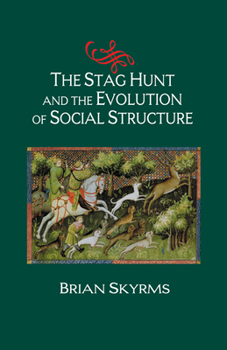The Stag Hunt and the Evolution of Social Structure
Select Format
Select Condition 
Book Overview
Brian Skyrms, author of the successful Evolution of the Social Contract (which won the prestigious Lakatos Award) has written a sequel. The book is a study of ideas of cooperation and collective... This description may be from another edition of this product.
Format:Paperback
Language:English
ISBN:0521533929
ISBN13:9780521533928
Release Date:February 2004
Publisher:Cambridge University Press
Length:166 Pages
Weight:0.45 lbs.
Dimensions:0.5" x 5.5" x 8.3"
Customer Reviews
2 ratings
Insightful Exploration of Social Games
Published by Thriftbooks.com User , 14 years ago
Brian Skyrms is one of the few philosophers who has been elected to the National Academy of Sciences of the United States. He is an outstanding example of what seems to me to be a trend in modern philosophy of science, which is to learn the relevant scientific practices thoroughly so that one's contribution as a philosopher is at a high technical level of expertise. This book is accessible to the interested non-professional, but the journal articles on which it is based are quite sophisticated. I am not sure whether we should consider Skyrms' ideas as contribution to social theory, social philosophy, or both. Then again, perhaps it doesn't matter. Skyrms' preferred method is to take a simple two-player game like the stag hunt or the prisoner's dilemma and explore the implications of repeating the game, playing it on a lattice, allowing player strategies to evolve, and otherwise enriching the game's structure to better approximate some forms of real social interaction. Skyrms is above all an explorer rather than an exhaustive taxonomist. He wanders through the forest of exotic plausible assumptions for two-person games, stops here and there to admire a particularly interesting specimen, and the moves on. This is a delightful approach for both the casual reader, who is not interested in complex details, and the professional student of game theory, who is tired of taking a highly specific game and absolutely beating it to death with forays of analytical purity. One serious limitation of this book is that Skyrms is almost single-mindedly concerned with two-player games, whereas understanding human social life requires n-player games for fairly high n (at least 20 in some important cases). While a deep understanding of two-person games does shed light on behavior in larger games, it also can be very misleading. Certainly human society is much more complicated than one might infer from the workings of the prisoner's dilemma, the stag hunt, and the hawk-dove game. I also believe that Skyrms' major point in this book is just dead wrong. In the Preface, Skyrms says "If one simple game is to be chosen as an exemplar of the central problem of the social contract, which should it be? Many modern thinkers have focused on the prisoner's dilemma, but I believe that this emphasis is misplaced. The most appropriate choice is not the prisoner's dilemma, but rather the stag hunt." (p. xii) Now, the stag hunt is a pure coordination game of the following form. Suppose there are n players (Skyrms prefers two players, but any n will do). If all players "hunt stag," each will receive an payoff of 1000 calories of meat. However, if any player decides instead to "hunt rabbit," the stag hunt will fail, and all players will get no calories except the rabbit hunter, who gets 100 calories. This is a coordination game, or an assurance game, because a player can be assured of getting 100 calories no matter what the others do (by hunting rabbit), but if the players can coord
Where does trust come from?
Published by Thriftbooks.com User , 15 years ago
Skyrms weaves together insights from game theory, evolutionary dynamics, computer simulations, and philosophy to address a crucial question: Where does trust come from? When do the trusting get ripped off? When do the trusting succeed? How can societies be set up so that they're more likely to build trust? Skyrms walks the reader through the key technical tools, so most college-educated readers should have little trouble following the key ideas. And the payoff is large: You'll think things you've never thought before about the nature of cooperation. I'd recommend reading this book along with Axelrod's classic Evolution of Cooperation to get a sense of where the serious study of society is heading. Since life in the modern rich countries depends so much on trust--trust within firms, trust across branches of government, and trust within communities--Skyrms's combination of big-picture thinking and cutting-edge rigor provides a great way to learn about this poorly-understood social phenomena.





